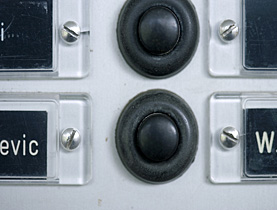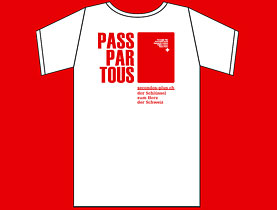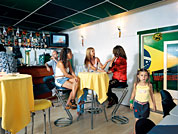Foreigners want to be able to ‘Swissify’ names

"What if Petrusic were called Glarner?" asks a campaign launched by a cantonal organisation for people in Switzerland with a migration background.
Second@s Plus Aargau, part of a national group that fights for citizenship and equal opportunities, wants to submit a bill that would enable naturalised Swiss to change their name without any problem.
Around a fifth of Switzerland’s 7.7 million inhabitants are foreigners, with an estimated 500,000 of them being second or third generation.
So-called secondos are born in Switzerland to immigrant parents, grow up in Switzerland and speak the local language. Almost half have a Swiss passport, according to Network Secondo.
Studies show it’s harder finding somewhere to live in Switzerland if you have a foreign name – especially one from the Balkans. The same is often the case when applying for a job.
With a view to equal opportunities, Second@s Plus Aargau is therefore demanding that foreign names can be changed in Swiss passports automatically as part of the naturalisation process.
New names for foreigners could even be discussed at a national level: Hans Stöckli, mayor of Biel and a politician from the centre-left Social Democratic Party, is considering putting forward a parliamentary motion.
But would it be enough for Suntharalingam, Ismajlovic or Petkovic to become Müller, Meier or Küenzli? Shouldn’t fighting xenophobic prejudices be first on the list?
“The proposed motion will certainly not solve every integration issue,” admits Ivica Petrusic, a youth worker and president of Second@s Plus Aargau, adding that the idea is certainly not accepted everywhere.
“Some people would even compare me with Christoph Mörgeli from the rightwing Swiss People’s Party [not known for his pro-immigration stance].”
Clanging symbols
Petrusic says the idea is pragmatic. Naturalised citizens, particularly those with Asian or Balkan names, have told him they want to adapt their name to the cultural context in Switzerland.
Migrants who have found their identity in Switzerland see to some extent a contradiction in their original name, according to the organisation’s website.
Petrusic, who lived in Bosnia until he was 14, has Swiss-Croatian double citizenship. His name is spelt differently in his two passports: in his Swiss one the diacritic which should be written on the suffix -ic – important for correct pronunciation – is missing.
“The residency office said their computers didn’t have the symbol,” he told swissinfo. “If my name’s going to be changed by the computer system, I’d prefer to change it myself.”
“Hassle”
For Petrusic, who wants to run in local authority elections on March 8, changing one’s name doesn’t mean losing one’s identity. It’s not an issue for women who take their husband’s name, he points out.
“The name belongs to me – it’s part of who I am. But it’s a hassle having to constantly repeat it or spell it.”
He says he’s been on the residency office council for four years but the people there still can’t pronounce his name properly.
“I just don’t want my name to be an issue the whole time,” he said, adding that he’s already switched to using his girlfriend’s surname when looking for an apartment.
Not easy
In the United States officially changing one’s name is simple; in Switzerland it is anything but.
First of all there must be “important reasons”, according to the civil code (article 30). What counts as important is decided by the relevant cantonal government.
The Federal Court adds that you can’t change your name to cover your tracks, but “ridiculous, ugly or offensive names” or those “which are always being mangled” have a good chance.
The fear of not being able to make any progress because of your name is not considered a satisfactory reason.
In 2002 the Federal Court, ruling in the case of two girls who lived with their divorced Swiss mother but had kept the surname of their Balkan father, decided it was not proven that most people were negatively influenced by the Balkan name.
“Wrong approach”
But an online project by the Swiss commercial employees’ association shows that foreigners looking for apprenticeships have a hard time. Their chances of getting an interview are measurably better if they can remain anonymous on the application form.
For Andrea Ruckstuhl, head of the youth section of the Swiss commercial employees’ association, the Second@s Plus motion is the “wrong approach”.
She says it would not solve the fundamental problem that in Switzerland many people display discriminatory attitudes towards non-Swiss.
“People who discriminate against foreigners would continue to do so whether there is one fewer person called Danovic or not,” she said.
swissinfo, based on an article in German by Corinne Buchser
There are 500,000 people born to immigrant parents in Switzerland. About one-third have become Swiss nationals.
A first-generation immigrant is someone who has moved to Switzerland, after being born elsewhere. A second-generation immigrant is born to first-generation immigrants.
In 2007 nearly 144,000 foreigners took up residence in Switzerland, an increase of 45 per cent from 2005.
The three cantons with the largest number of permanent foreign residents are Zurich (299,842), Vaud (195,071) and Geneva (163,951).
The three cantons with the largest proportions of foreign residents are Basel City with 33.3 per cent (56,106 people), Schaffhausen with 31.6 per cent (16,323 people), and Basel Country with 29.9 per cent (48,719 people).
Foreign residents must wait at least 12 years before being eligible to apply for citizenship.
Foreigners married to Swiss nationals can take advantage of a simplified or “facilitated” procedure, reducing the number of years they have to wait (see related site, Federal Migration Office).
Successful applicants must show that they are integrated into Swiss society, comply with Swiss law and pose no threat to internal or external security.
The cantonal and local authorities are responsible for naturalisation procedures.

In compliance with the JTI standards
More: SWI swissinfo.ch certified by the Journalism Trust Initiative



You can find an overview of ongoing debates with our journalists here. Please join us!
If you want to start a conversation about a topic raised in this article or want to report factual errors, email us at english@swissinfo.ch.